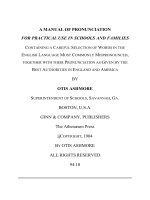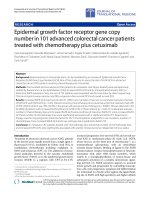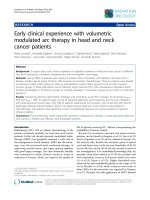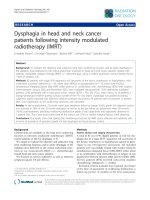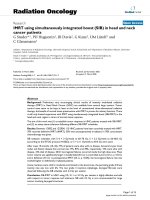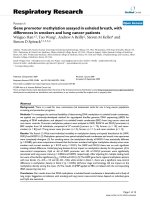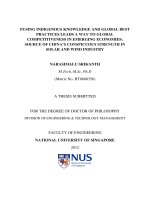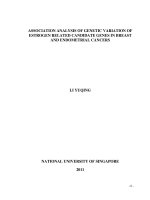Screening of Finnish RAD51C founder mutations in prostate and colorectal cancer patients
Bạn đang xem bản rút gọn của tài liệu. Xem và tải ngay bản đầy đủ của tài liệu tại đây (234.75 KB, 4 trang )
Pelttari et al. BMC Cancer 2012, 12:552
/>
RESEARCH ARTICLE
Open Access
Screening of Finnish RAD51C founder mutations
in prostate and colorectal cancer patients
Liisa M Pelttari1, Riikka Nurminen2, Alexandra Gylfe3, Lauri A Aaltonen3, Johanna Schleutker2,4
and Heli Nevanlinna1*
Abstract
Background: Rare, heterozygous germline mutations in the RAD51C gene have been found in breast and ovarian
cancer families. In the Finnish population, we have identified two founder mutations in RAD51C that increase the
risk of ovarian cancer but not breast cancer in the absence of ovarian cancer. Risk for other cancers has not been
studied.
Methods: To study the role of RAD51C mutations in other common cancer types, we genotyped the Finnish
RAD51C founder mutations c.837 + 1G > A and c.93delG in 1083 prostate cancer patients and 802 colorectal cancer
patients using TaqMan Real-Time PCR.
Results: No RAD51C mutations c.837 + 1G > A or c.93delG were detected among the prostate or colorectal cancer
patients.
Conclusions: The results suggest that the RAD51C mutations do not predispose to prostate or colorectal cancer.
Keywords: RAD51C, Prostate cancer, Colorectal cancer, Breast cancer, Ovarian cancer, Founder mutation
Background
Mutations in cancer susceptibility genes may predispose
the carriers to different cancer types. The most important high penetrance breast and ovarian cancer susceptibility genes are BRCA1 and BRCA2 [1] but, in addition
to breast and ovarian cancer, germline mutations in
these genes also increase the risk of prostate cancer [2,3]
and in BRCA2 also of pancreatic cancer [4]. In addition
to the hereditary breast and ovarian cancer syndrome
caused by germline mutations in BRCA1 and BRCA2,
ovarian cancer is also present in the Lynch syndrome
that is caused by germline mutations in DNA mismatch
repair genes and characterized by susceptibility to colorectal cancer [5]. Increased risk of breast cancer is also
present in other rare cancer predisposition syndromes,
namely Li-Fraumeni, Cowden and Peutz-Jeghers syndrome and ataxia-telangiectasia, which also predispose
to other cancer types as well [1].
* Correspondence:
1
Departments of Obstetrics and Gynecology, Helsinki University Central
Hospital and University of Helsinki, Helsinki, Finland
Full list of author information is available at the end of the article
Biallelic mutations in BRCA2 and in moderate penetrance breast cancer susceptibility genes PALB2 and
BRIP1 cause Fanconi anemia, a chromosomal instability
disorder characterized by developmental abnormalities,
bone marrow failure, and cancer susceptibility, while
heterozygous germline mutations increase the risk of
breast cancer [6]. In addition to breast cancer, heterozygous mutations in PALB2 also increase the risk of pancreatic cancer [4] but not prostate cancer [7,8]. In
RAD51C, heterozygous germline mutations have been
identified in breast and ovarian cancer families [9] and a
homozygous missense mutation was found in a Fanconi
anemia like disorder [10]. Following the original report,
we and others have found rare deleterious mutations
among breast and/or ovarian cancer families [11-17] but
quite a few studies have not identified any clearly pathogenic mutations [18-24]. Indeed, the RAD51C mutations
seem to be very rare. The association with ovarian cancer is well-established but whether the mutations also
confer a risk for breast cancer remains controversial.
Meindl et al. [9,25] and Osorio et al. [16] state that
RAD51C mutations predispose to breast and ovarian
cancer whereas Loveday et al. [17] estimated the relative
© 2012 Pelttari et al.; licensee BioMed Central Ltd. This is an Open Access article distributed under the terms of the Creative
Commons Attribution License ( which permits unrestricted use, distribution, and
reproduction in any medium, provided the original work is properly cited.
Pelttari et al. BMC Cancer 2012, 12:552
/>
risk of ovarian cancer for RAD51C protein truncating
mutation carriers to be 5.88 but no elevated risk for
breast cancer.
We recently sequenced the RAD51C gene in 277
Finnish breast and/or ovarian cancer families and identified two recurrent deleterious, protein truncating mutations c.837 + 1G > A and c.93delG and subsequently
genotyped the mutations in a large series of breast and
ovarian cancer patients and families [12]. The mutations
significantly increased the risk of ovarian cancer but not
breast cancer in the absence of ovarian cancer family
history, indicating RAD51C as the first moderate penetrance susceptibility gene for ovarian cancer. The mutation carrier families shared a common haplotype
indicating a founder effect for the mutations. Moreover,
many of the mutation carriers had family history of various cancer types, including for instance colon and prostate cancer. Here we have genotyped the RAD51C
mutations c.837 + 1G > A and c.93delG in 1083 prostate
and 802 colorectal cancer patients to assess the risk for
these cancer types. To our knowledge, the role of
RAD51C mutations in other cancer types than breast
and ovarian cancer has not been studied so far.
Methods
Subjects
The RAD51C mutations c.837 + 1G > A and c.93delG
were genotyped in 1083 Finnish prostate cancer cases
and 802 colorectal cancer cases. The prostate cancer
patients included 894 unselected cases and 189 prostate
cancer families. The unselected cases were collected
from the Pirkanmaa Hospital District. The patients had
been diagnosed with prostate cancer at the urology outpatient clinic at the Tampere University Hospital between years 1980 and 2008. All families included two or
more affected members (the youngest affected male
from each family was included in the analysis) and were
collected as previously described [26]. The samples were
genomic DNA isolated from peripheral blood with the
Puregene kit, according to the manufacturer’s instructions (Gentra Systems, Inc., Minneapolis, MN, USA).
The colorectal cancer patients studied included 509
consecutive patients collected between May 1994 and
April 1996 and 535 consecutive patients collected between March 1996 and June 1998 at nine large regional
hospitals in southeastern Finland as described previously
[27,28]. DNA was isolated from normal mucosa or blood
by conventional DNA extraction methods. DNA was
available from 802 patients. All the samples were
screened for microsatellite instability (MSI) and the MSI
positive cases were screened for MLH1 and MSH2 mutations. Of the 802 patients, 104 had family background of
colorectal cancer and MLH1 and MSH2 mutations were
identified in 19 cases.
Page 2 of 4
This study was carried out according to the Helsinki
declaration with informed consents from the patients
and with permissions from Institutional Review Board of
the Tampere University Hospital, The Ministry of Health
and Social Affairs, National Authority for Medical
Affairs, National Institute for Health and Welfare and
Helsinki University Hospital Ethics Committee.
Genotyping
We used TaqMan Custom Assays and TaqMan Genotyping MasterMix (Applied Biosystems, Foster City, CA,
USA) to genotype the c.837 + 1G > A and c.93delG
mutations. PCR was performed in 7500 Fast Real-Time
PCR System or in 9800 Fast Thermal Cycler and genotype calling was performed with 7500 Fast Real-Time
PCR System and ABI Prism 7500 SDS v1.4 software
(Applied Biosystems, Foster City, CA, USA).
Results and discussion
Most moderate penetrance mutations identified so far,
including mutations in RAD51C, appear to be very rare
with mostly unique mutations in out-bread populations.
This poses considerable challenges for investigating
them in large series of patients with different cancer
types to determine association also with other cancers.
We took here advantage of the RAD51C founder mutations in Finland and genotyped the c.837 + 1G > A and
c.93delG mutations in 1083 prostate and 802 colorectal
cancer patients, including also familial cases. No mutations were detected among the patients.
We previously detected the RAD51C c.837 + 1G > A or
c.93delG mutations in 1.4% of Finnish ovarian cancer
patients (in 1% of unselected ovarian cancer patients and
in 25% of ovarian cancer families) compared to 0.2% in
controls, indicating a significantly increased risk of ovarian cancer with also clinical implications for the carriers
[12]. Moreover, the mutation carrier families were found
to share a common haplotype indicating a shared ancestry for the families and a founder effect for the mutations in the Finnish population. Founder mutations are
typical for isolated populations, such as the Finnish
population, and they may explain a major fraction of all
mutations in specific genes [29,30]. In the Finnish population, strong founder mutations have been detected for
instance in the breast cancer susceptibility genes BRCA1
and BRCA2 [31] as well as in PALB2 [32].
Some of the RAD51C mutation carriers in our previous study [12] had family history of diverse cancer types
(abdomen, brain, bone marrow, cervical, colon, female
genital, kidney, leukemia, liver, lung, melanoma, pancreas, prostate, skin, stomach, tongue, and ventricle) but
unfortunately we did not have available samples for
genotyping of these relatives. Few other studies have also
Pelttari et al. BMC Cancer 2012, 12:552
/>
identified RAD51C mutation carrier families with diverse
cancer types [9,11,13,15-17]. This prompted us to study
the effect of the mutations also on other common cancer
types besides breast and ovarian cancer by screening of
the founder mutations in an extensive series of prostate
and colorectal cancer cases.
There is a clear genetic component in prostate cancer
susceptibility and several common low-risk genomic loci
for prostate cancer susceptibility have been found but no
high-penetrance genes have been identified [33,34].
Linkage studies have suggested that a prostate cancer
susceptibility gene may be located on chromosome
17q22 [35,36], a region including also the RAD51C
locus, whereas genome-wide association studies
(GWAS) have identified common low risk variants in
17q12 and 17q24 regions [37,38]. Finnish as well as
other Northern European patients have been included
both in the linkage and in the GWA studies [35,36,38].
Several low-risk loci have also been identified for colorectal cancer but 17q22 has not been implicated in colorectal cancer susceptibility [39]. It has been estimated
that 15–30% of colorectal cancer may be hereditary and
approximately one-quarter of the familial cases occur as
part of inherited colorectal tumor syndromes, mainly the
Lynch syndrome caused by mutations in DNA mismatch
repair genes, such as MSH2 and MLH1, and the familial
adenomatous polyposis syndrome caused by mutations
in the APC gene [40]. The absence of the RAD51C
founder mutations among the prostate and colorectal
cancer patients genotyped here suggests that RAD51C
does not contribute to prostate or colorectal cancer predisposition. However, we cannot fully exclude a possible
role of RAD51C as there might be mutation specific
effects on cancer risk. To fully assess the role of
RAD51C in susceptibility to other cancer types, screening of the whole coding region of the gene in large sample sets would be needed.
Conclusions
In conclusion, we did not detect the Finnish founder
mutations in the RAD51C gene among 1083 prostate
and 802 colorectal cancer patients suggesting that the
RAD51C mutations do not predispose to prostate or
colorectal cancer. These results have clinical value in
assessing the cancer risks associated with RAD51C
mutations in the mutation carrier families.
Competing interests
The authors declare that they have no competing interests.
Authors’ contributions
LMP and HN designed the study and wrote the manuscript. LMP and RN
carried out the genotyping. JS, AG and LA contributed samples and patient
information. All authors read and approved the final manuscript.
Page 3 of 4
Acknowledgements
This study has been supported by the Helsinki University Central Hospital
Research Fund, the Academy of Finland (132473), the Sigrid Juselius
Foundation and the Finnish Cancer Society.
Author details
1
Departments of Obstetrics and Gynecology, Helsinki University Central
Hospital and University of Helsinki, Helsinki, Finland. 2Institute of Biomedical
Technology/BioMediTech, University of Tampere and Fimlab Laboratories,
Tampere, Finland. 3Department of Medical Genetics, Genome-Scale Biology
Research Program, University of Helsinki, Helsinki, Finland. 4Department of
Medical Biochemistry and Genetics, University of Turku, Turku, Finland.
Received: 15 May 2012 Accepted: 13 November 2012
Published: 23 November 2012
References
1. Stratton MR, Rahman N: The emerging landscape of breast cancer
susceptibility. Nat Genet 2008, 40:17–22.
2. Leongamornlert D, Mahmud N, Tymrakiewicz M, Saunders E, Dadaev T,
Castro E, Goh C, Govindasami K, Guy M, O’Brien L, Sawyer E, Hall A,
Wilkinson R, Easton D, The UKGPCS Collaborators, Goldgar D, Eeles R, KoteJarai Z: Germline BRCA1 mutations increase prostate cancer risk. Br J
Cancer 2012, 106:1697–1701.
3. Kote-Jarai Z, Leongamornlert D, Saunders E, Tymrakiewicz M, Castro E,
Mahmud N, Guy M, Edwards S, O’Brien L, Sawyer E, Hall A, Wilkinson R,
Dadaev T, Goh C, Easton D, UKGPCS Collaborators, Goldgar D, Eeles R:
BRCA2 is a moderate penetrance gene contributing to young-onset
prostate cancer: implications for genetic testing in prostate cancer
patients. Br J Cancer 2011, 105:1230–1234.
4. Klein AP: Genetic susceptibility to pancreatic cancer. Mol Carcinog 2012,
51:14–24.
5. Lynch HT, Casey MJ, Snyder CL, Bewtra C, Lynch JF, Butts M, Godwin AK:
Hereditary ovarian carcinoma: heterogeneity, molecular genetics,
pathology, and management. Mol Oncol 2009, 3:97–137.
6. D’Andrea AD: Susceptibility pathways in Fanconi’sanemia and breast
cancer. N Engl J Med 2010, 362:1909–1919.
7. Tischkowitz M, Sabbaghian N, Ray AM, Lange EM, Foulkes WD, Cooney KA:
Analysis of the gene coding for the BRCA2-interacting protein PALB2 in
hereditary prostate cancer. Prostate 2008, 68:675–678.
8. Pakkanen S, Wahlfors T, Siltanen S, Patrikainen M, Matikainen MP, Tammela
TL, Schleutker J: PALB2 Variants in hereditary and unselected Finnish
prostate cancer cases. J Negat Results Biomed 2009, 8:12.
9. Meindl A, Hellebrand H, Wiek C, Erven V, Wappenschmidt B, Niederacher D,
Freund M, Lichtner P, Hartmann L, Schaal H, Ramser J, Honisch E, Kubisch C,
Wichmann HE, Kast K, Deissler H, Engel C, Muller-Myhsok B, Neveling K,
Kiechle M, Mathew CG, Schindler D, Schmutzler RK, Hanenberg H: Germline
mutations in breast and ovarian cancer pedigrees establish RAD51C as a
human cancer susceptibility gene. Nat Genet 2010, 42:410–414.
10. Vaz F, Hanenberg H, Schuster B, Barker K, Wiek C, Erven V, Neveling K, Endt
D, Kesterton I, Autore F, Fraternali F, Freund M, Hartmann L, Grimwade D,
Roberts RG, Schaal H, Mohammed S, Rahman N, Schindler D, Mathew CG:
Mutation of the RAD51C gene in a fanconianemia-like disorder.
Nat Genet 2010, 42:406–409.
11. Romero A, Perez-Segura P, Tosar A, Garcia-Saenz JA, Diaz-Rubio E, Caldes T,
de la Hoya M: A HRM-based screening method detects RAD51C germline deleterious mutations in Spanish breast and ovarian cancer families.
Breast Cancer Res Treat 2011, 129:939–946.
12. Pelttari LM, Heikkinen T, Thompson D, Kallioniemi A, Schleutker J, Holli K,
Blomqvist C, Aittomaki K, Butzow R, Nevanlinna H: RAD51C is a
susceptibility gene for ovarian cancer. Hum Mol Genet 2011,
20:3278–3288.
13. Vuorela M, Pylkas K, Hartikainen JM, Sundfeldt K, Lindblom A, von
WachenfeldtWappling A, Haanpaa M, Puistola U, Rosengren A, Anttila M,
Kosma VM, Mannermaa A, Winqvist R: Further evidence for the
contribution of the RAD51C gene in hereditary breast and ovarian
cancer susceptibility. Breast Cancer Res Treat 2011, 130:1003–1010.
14. Walsh T, Casadei S, Lee MK, Pennil CC, Nord AS, Thornton AM, Roeb W,
Agnew KJ, Stray SM, Wickramanayake A, Norquist B, Pennington KP, Garcia
RL, King MC, Swisher EM: Mutations in 12 genes for inherited ovarian,
Pelttari et al. BMC Cancer 2012, 12:552
/>
15.
16.
17.
18.
19.
20.
21.
22.
23.
24.
25.
26.
27.
28.
29.
30.
31.
fallopian tube, and peritoneal carcinoma identified by massively parallel
sequencing. Proc Natl Acad Sci U S A 2011, 108:18032–18037.
Thompson ER, Boyle SE, Johnson J, Ryland GL, Sawyer S, Choong DY,
kConFab, Chenevix-Trench G, Trainer AH, Lindeman GJ, Mitchell G,
James PA, Campbell IG: Analysis of RAD51C germline mutations in
high-risk breast and ovarian cancer families and ovarian cancer patients.
Hum Mutat 2012, 33:95–99.
Osorio A, Endt D, Fernandez F, Eirich K, Hoya MD, Schmutzler R, Caldes T,
Meindl A, Schindler D, Benitez J: Predominance of pathogenic missense
variants in the RAD51C gene occurring in breast and ovarian cancer
families. Hum Mol Genet 2012, 21:2889–2898.
Loveday C, Turnbull C, Ruark E, Xicola RM, Ramsay E, Hughes D,
Warren-Perry M, Snape K, Breast Cancer Susceptibility Collaboration (BCSC)
(UK), Eccles D, Evans DG, Gore M, Renwick A, Seal S, Antoniou AC,
Rahman N: Germline RAD51C mutations confer susceptibility to ovarian
cancer. Nat Genet 2012, 44:475–476.
Zheng Y, Zhang J, Hope K, Niu Q, Huo D, Olopade OI: Screening RAD51C
nucleotide alterations in patients with a family history of breast and
ovarian cancer. Breast Cancer Res Treat 2010, 124:857–861.
Akbari MR, Tonin P, Foulkes WD, Ghadirian P, Tischkowitz M, Narod SA:
RAD51C germline mutations in breast and ovarian cancer patients.
Breast Cancer Res 2010, 12:404.
Wong MW, Nordfors C, Mossman D, Pecenpetelovska G, Avery-Kiejda KA,
Talseth-Palmer B, Bowden NA, Scott RJ: BRIP1, PALB2, and RAD51C
mutation analysis reveals their relative importance as genetic
susceptibility factors for breast cancer. Breast Cancer Res Treat 2011,
127:853–859.
Pang Z, Yao L, Zhang J, Ouyang T, Li J, Wang T, Fan Z, Fan T, Lin B, Xie Y:
RAD51C germline mutations in Chinese women with familial breast
cancer. Breast Cancer Res Treat 2011, 129:1019–1020.
Clague J, Wilhoite G, Adamson A, Bailis A, Weitzel JN, Neuhausen SL:
RAD51C germline mutations in breast and ovarian cancer cases from
high-risk families. PLoS One 2011, 6(9):e25632.
De Leeneer K, Van Bockstal M, De Brouwer S, Swietek N, Schietecatte P,
Sabbaghian N, Van den Ende J, Willocx S, Storm K, Blaumeiser B, Van
Asperen CJ, Wijnen JT, Leunen K, Legius E, Michils G, Matthijs G, Blok MJ,
Gomez-Garcia E, De Paepe A, Tischkowitz M, Poppe B, Claes K: Evaluation
of RAD51C as cancer susceptibility gene in a large breast-ovarian cancer
patient population referred for genetic testing. Breast Cancer Res Treat
2012, 133:393–398.
Lu W, Wang X, Lin H, Lindor NM, Couch FJ: Mutation screening of RAD51C
in high-risk breast and ovarian cancer families. Fam Cancer 2012,
11:381–385.
Meindl A, Eirich K, Engert S, Becker A, Endt D, Ditsch N, Schmutzler RK,
Schindler D: Germline RAD51C mutations confer susceptibility to ovarian
cancer. Nat Genet 2012, 44:476.
Matikainen MP, Sankila R, Schleutker J, Kallioniemi OP, Pukkala E:
Nationwide cancer family ascertainment using Finnish cancer registry
data on family names and places of birth for 35,761 prostate cancer
patients. Int J Cancer 2000, 88:307–312.
Aaltonen LA, Salovaara R, Kristo P, Canzian F, Hemminki A, Peltomaki P,
Chadwick RB, Kaariainen H, Eskelinen M, Jarvinen H, Mecklin JP, de la
Chapelle A: Incidence of hereditary nonpolyposis colorectal cancer and
the feasibility of molecular screening for the disease. N Engl J Med 1998,
338:1481–1487.
Salovaara R, Loukola A, Kristo P, Kaariainen H, Ahtola H, Eskelinen M,
Harkonen N, Julkunen R, Kangas E, Ojala S, Tulikoura J, Valkamo E,
Jarvinen H, Mecklin JP, Aaltonen LA, de la Chapelle A: Population-based
molecular detection of hereditary nonpolyposis colorectal cancer.
J ClinOncol 2000, 18:2193–2200.
Arcos-Burgos M, Muenke M: Genetics of population isolates. Clin Genet
2002, 61:233–247.
Peltonen L, Jalanko A, Varilo T: Molecular genetics of the Finnish disease
heritage. Hum Mol Genet 1999, 8:1913–1923.
Sarantaus L, Huusko P, Eerola H, Launonen V, Vehmanen P, Rapakko K,
Gillanders E, Syrjakoski K, Kainu T, Vahteristo P, Krahe R, Paakkonen K,
Hartikainen J, Blomqvist C, Lopponen T, Holli K, Ryynanen M, Butzow R,
Borg A, WastesonArver B, Holmberg E, Mannermaa A, Kere J, Kallioniemi OP,
Winqvist R, Nevanlinna H: Multiple founder effects and geographical
clustering of BRCA1 and BRCA2 families in Finland. Eur J Hum Genet 2000,
8:757–763.
Page 4 of 4
32. Erkko H, Xia B, Nikkila J, Schleutker J, Syrjakoski K, Mannermaa A,
Kallioniemi A, Pylkas K, Karppinen SM, Rapakko K, Miron A, Sheng Q, Li G,
Mattila H, Bell DW, Haber DA, Grip M, Reiman M, Jukkola-Vuorinen A,
Mustonen A, Kere J, Aaltonen LA, Kosma VM, Kataja V, Soini Y, Drapkin RI,
Livingston DM, Winqvist R: A recurrent mutation in PALB2 in Finnish
cancer families. Nature 2007, 446:316–319.
33. Schaid DJ: The complex genetic epidemiology of prostate cancer. Hum
Mol Genet 2004, 13(Suppl 1):R103–R121.
34. Kim ST, Cheng Y, Hsu FC, Jin T, Kader AK, Zheng SL, Isaacs WB, Xu J, Sun J:
Prostate cancer risk-associated variants reported from genome-wide
association studies: meta-analysis and their contribution to genetic
variation. Prostate 2010, 70:1729–1738.
35. Gillanders EM, Xu J, Chang BL, Lange EM, Wiklund F, Bailey-Wilson JE,
Baffoe-Bonnie A, Jones M, Gildea D, Riedesel E, Albertus J, Isaacs SD,
Wiley KE, Mohai CE, Matikainen MP, Tammela TL, Zheng SL, Brown WM,
Rokman A, Carpten JD, Meyers DA, Walsh PC, Schleutker J, Gronberg H,
Cooney KA, Isaacs WB, Trent JM: Combined genome-wide scan for
prostate cancer susceptibility genes. J Natl Cancer Inst 2004,
96:1240–1247.
36. Cropp CD, Simpson CL, Wahlfors T, Ha N, George A, Jones MS, Harper U,
Ponciano-Jackson D, Green TA, Tammela TL, Bailey-Wilson J, Schleutker J:
Genome-wide linkage scan for prostate cancer susceptibility in Finland:
evidence for a novel locus on 2q37.3 and confirmation of signal on
17q21-q22. Int J Cancer 2011, 129(10):2400–2407.
37. Gudmundsson J, Sulem P, Steinthorsdottir V, Bergthorsson JT,
Thorleifsson G, Manolescu A, Rafnar T, Gudbjartsson D, Agnarsson BA,
Baker A, Sigurdsson A, Benediktsdottir KR, Jakobsdottir M, Blondal T,
Stacey SN, Helgason A, Gunnarsdottir S, Olafsdottir A, Kristinsson KT,
Birgisdottir B, Ghosh S, Thorlacius S, Magnusdottir D, Stefansdottir G,
Kristjansson K, Bagger Y, Wilensky RL, Reilly MP, Morris AD, Kimber CH, et al:
Two variants on chromosome 17 confer prostate cancer risk, and the
one in TCF2 protects against type 2 diabetes. Nat Genet 2007, 39:977–983.
38. Jin G, Lu L, Cooney KA, Ray AM, Zuhlke KA, Lange EM, Cannon-Albright LA,
Camp NJ, Teerlink CC, Fitzgerald LM, Stanford JL, Wiley KE, Isaacs SD,
Walsh PC, Foulkes WD, Giles GG, Hopper JL, Severi G, Eeles R, Easton D,
Kote-Jarai Z, Guy M, Rinckleb A, Maier C, Vogel W, Cancel-Tassin G, Egrot C,
Cussenot O, Thibodeau SN, McDonnell SK, et al: Validation of prostate
cancer risk-related loci identified from genome-wide association studies
using family-based association analysis: evidence from the international
consortium for prostate cancer genetics (ICPCG). Hum Genet 2012,
131:1095–1103.
39. Varghese JS, Easton DF: Genome-wide association studies in common
cancers–what have we learnt? Curr Opin Genet Dev 2010, 20(3):201–209.
40. Fearon ER: Molecular genetics of colorectal cancer. Annu Rev Pathol 2011,
6:479–507.
doi:10.1186/1471-2407-12-552
Cite this article as: Pelttari et al.: Screening of Finnish RAD51C founder
mutations in prostate and colorectal cancer patients. BMC Cancer 2012
12:552.
Submit your next manuscript to BioMed Central
and take full advantage of:
• Convenient online submission
• Thorough peer review
• No space constraints or color figure charges
• Immediate publication on acceptance
• Inclusion in PubMed, CAS, Scopus and Google Scholar
• Research which is freely available for redistribution
Submit your manuscript at
www.biomedcentral.com/submit
